|
|
|
Sort Order |
|
|
|
Items / Page
|
|
|
|
|
|
|
| Srl | Item |
| 1 |
ID:
137759
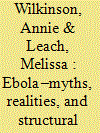

|
|
|
|
|
| Summary/Abstract |
TEN MONTHS AFTER THE FIRST INFECTION, Margaret Chan, Director-General of the World Health Organization, described the Ebola epidemic in West Africa as the ‘most severe acute public health emergency in modern times’. The disaster, she said, represents a ‘crisis for international peace and security’ and threatens the ‘very survival of societies and governments in already very poor countries’.1 As of October 2014, the disease had killed 4,951 and infected 13,567.2 It has crippled families, health systems, livelihoods, food supplies and economies in its wake. These numbers are likely to be vastly underestimated. How did it get to this? Why has this outbreak been so much larger than previous ones? The scale of the disaster has been attributed to the weak health systems of affected countries, their lack of resources, the mobility of communities and their inexperience in dealing with Ebola.3 This answer, however, is woefully de-contextualized and de-politicized. This briefing examines responses to the outbreak and offers a different set of explanations, rooted in the history of the region and the political economy of global health and development.
|
|
|
|
|
|
|
|
|
|
|
|
|
|
|
|
| 2 |
ID:
137758


|
|
|
|
|
| Summary/Abstract |
This article examines the impact of UN-imposed sanctions on the stability of the Eritrean regime, with a focus on the reaction of the diaspora. It explores the transnational nature of Eritrean society and examines the history and structure of the Eritrean diaspora as well as its transformation since the political crisis of 2001. The article demonstrates that the government, as well as both its supporters and its opponents in the diaspora, have all instrumentalized sanctions for their own purposes. The government has used sanctions to rally supporters “around the flag”, calling on the diaspora to raise funds to negate their effect. By contrast, opposition activists have campaigned against the 2 percent “diaspora tax” levied by the government, arguing that it may be used for illicit military purposes in breach of the sanctions regime. In this sense, the sanctions have destabilized a core component of the regime's resource base. However, the failure of the diasporic opposition to organize a joint campaign to persuade host governments to outlaw the collection of the tax has undermined its efforts. Funds raised through the diaspora tax thus continue to flow into government coffers, playing a stabilizing role in spite of the UN sanctions regime.
|
|
|
|
|
|
|
|
|
|
|
|
|
|
|
|
| 3 |
ID:
137753
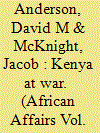

|
|
|
|
|
| Summary/Abstract |
Kenya’s invasion of southern Somalia, which began in October 2011, has turned into an occupation of attrition – while “blowback” from the invasion has consolidated in a series of deadly Al-Shabaab attacks within Kenya. This article reviews the background to the invasion, Operation Linda Nchi, and the prosecution of the war by Kenya’s Defence Forces up to the capture of the city of Kismayo and the contest to control its lucrative port. The second section discusses Al-Shabaab’s response, showing how the movement has reinvented itself to take the struggle into Kenya. We conclude that while the military defeat of Al-Shabaab in southern Somalia seems inevitable, such a victory may become irrelevant to Kenya’s ability to make a political settlement with its Somali and wider Muslim communities at home.
|
|
|
|
|
|
|
|
|
|
|
|
|
|
|
|
| 4 |
ID:
137757


|
|
|
|
|
| Summary/Abstract |
During the last decade, the Lord's Resistance Army (LRA) became a regional problem in the border area of the Democratic Republic of Congo, South Sudan, and the Central African Republic, involving multiple national and international actors. This article explains why these actors often present diametrically opposed images of the LRA instead of developing a unified vision. More specifically, the article discusses how the Ugandan and Congolese governments and armies, and the US government and advocacy groups, each frame the LRA differently. These various frames are influenced by the actors' interests and by the specific historical development of political relations between them. Politically influential constituencies played a significant role in this endeavour. In the US, lobby groups such as Invisible Children, Enough, and Resolve had an important impact on the way in which the American government framed the LRA. Conversely, the lack of such a powerful constituency in the LRA-affected countries gave these governments ample space to frame the LRA in a variety of ways. The lack of reliable information about the current capacities of the LRA, combined with the LRA's lack of a strong and coherent image, further contributed to this situation. In short, the ways in which the LRA is framed enabled these key actors to pursue goals that may remain distant from the reality of the LRA.
|
|
|
|
|
|
|
|
|
|
|
|
|
|
|
|
| 5 |
ID:
137754
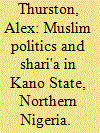

|
|
|
|
|
| Summary/Abstract |
Since 1999, Muslim-majority northern Nigeria has witnessed a new phase of political struggles over the place of Islamic law (shari'a) in public life. This article traces how Muslim politics played into shari'a administration in Kano, northern Nigeria's most populous state, and argues that governmental bureaucracies created for the purpose of administering shari'a became sites of political contests over the meaning of public morality in Islamic terms. Shari'a bureaucracies featured as prizes in unstable political alliances between Muslim scholars and elected Muslim politicians. Politicians' appointments of Muslim scholars to bureaucratic positions, and their empowerment or disempowerment of certain bureaucracies, posed fundamental questions concerning who would control the shari'a project and what its content would be. The manoeuvres surrounding Kano's shari'a bureaucracies reflect broader trends in northern Nigerian politics. The shari'a project has not been a manifestation of Islamism in a narrow sense, but rather the site of a more complex set of intra-Muslim rivalries and electoral competition within an ostensibly secular political system.
|
|
|
|
|
|
|
|
|
|
|
|
|
|
|
|
| 6 |
ID:
137756
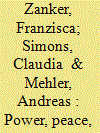

|
|
|
|
|
| Summary/Abstract |
Power-sharing agreements have become a blueprint for efforts to end violent conflicts in many parts of the world, particularly in Africa. Such agreements, however, rarely include territorial power sharing – at least, not according to the formal, rather unhelpful narrow definition that includes federalism and decentralization. This article argues that the concept of territorial power sharing needs to be broadened in order to account for the manifold informal or indirect manifestations of such arrangements. Drawing on extensive fieldwork data from the DRC, Liberia, and Kenya, the article analyses the history of spatiality and power in Africa in order to explain why formal mechanisms of territorial power sharing are rare and why more subtle types of informal territorial power sharing are much more common. Based on this analysis, we conclude that territorial power sharing is present in many African states, but that typically it is overlooked because of its informal nature.
|
|
|
|
|
|
|
|
|
|
|
|
|
|
|
|
| 7 |
ID:
137755
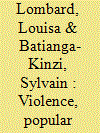

|
|
|
|
|
| Summary/Abstract |
People seeking to understand the scope and scale of violence in the Central African Republic over the past two years have cited a variety of social grievances centring on the political manipulation of religion, belonging, and access to opportunities. Without denying that these factors have played a role, this article argues that the violence must be understood in the context of social practices of violence that long predate the war, especially in light of the diffuse and non-centralized mode of organization through which the ongoing war has played out. The article focuses on the prevalence of popular punishment and vengeance, which have long histories as elements of statecraft in the CAR and have become even more widespread amid the generalized insecurity and anomie that have set in over the past few decades. The article presents evidence of the workings of popular punishment from the intra-family level to that of the crowd and quartier, in both rural and urban locales. Though people have important reservations about popular punishment, they also see vengeance as an important tool for enforcing a circumscribed mode of empathy and a minimum set of standards for social behaviour. These experiences in the CAR suggest that those wishing to understand how wartime mobilization happens must consider not just fighters' grievances but also people's conceptions of the practical and symbolic efficacy of vengeance and popular punishment as elements of politics and the management of threats.
|
|
|
|
|
|
|
|
|
|
|
|
|
|
|
|
|
|
|
|
|